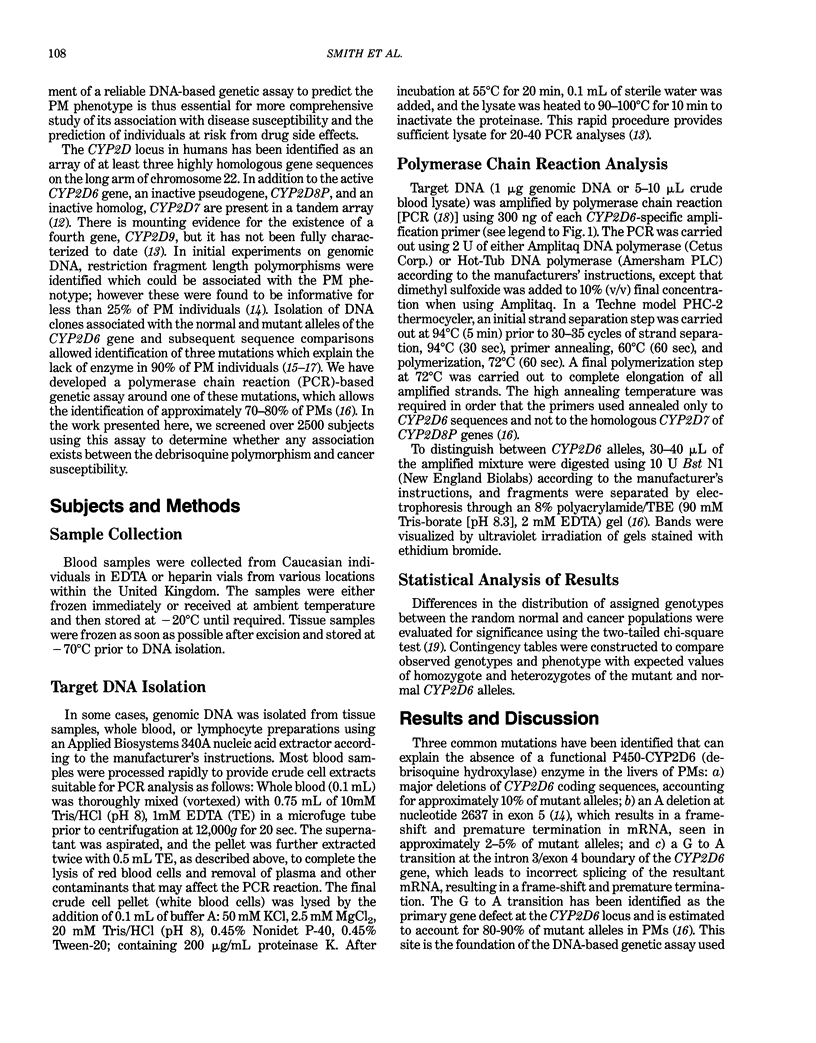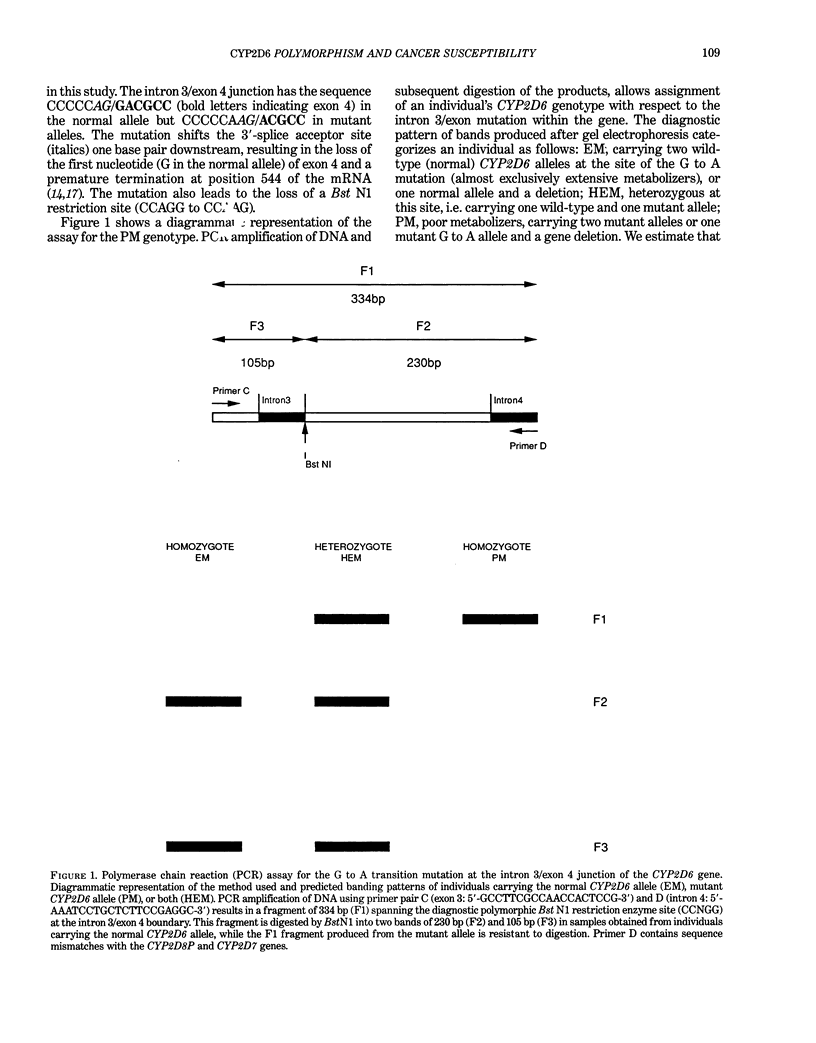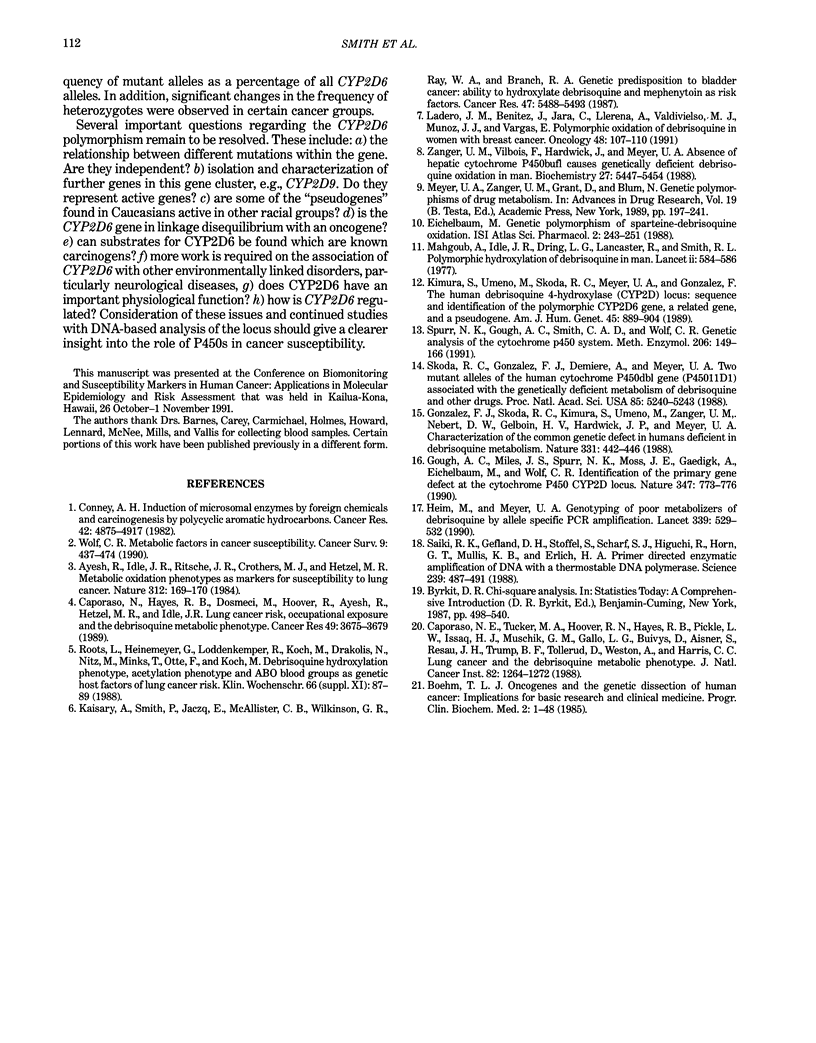Abstract
The cytochrome P450-dependent monooxygenases play a central role in the metabolism of chemical carcinogens. The action of these enzymes can lead to either carcinogen detoxication or activation. Differences in P450 expression in animal models give rise to large differences in susceptibility to chemical carcinogens, so genetic polymorphisms in P450 expression may be expected to be an important factor in individual human susceptibility to cancer. Of particular interest is the genetic polymorphism at the cytochrome P450-debrisoquine/sparteine hydroxylase locus (CYP2D6). Although this is a minor liver P450, its polymorphic expression is associated with the abnormal metabolism of at least 30 therapeutic drugs, including beta-blockers and tricyclic antidepressants. Conflicting reports have been made on the association of this polymorphism with cancer susceptibility. This disagreement may be attributable to limitations of the phenotyping assay used to identify affected individuals (poor metabolizers, PMs). In order to clarify these anomalies, we have developed a simple DNA-based assay with which we can identify the majority of PMs. The assay is centered around the primary gene defect responsible for the polymorphism, a G to A transition at the junction of intron 3/exon 4 which results in a frame-shift in the resultant mRNA. The frequency of this mutation is 70-80% in PMs. We have studied the frequency of mutated alleles in a control population and in a wide range of cancer patients. No association between this polymorphism and lung cancer susceptibility was observed; however, in other populations of cancer patients some very interesting shifts were found in the proportion of PMs and heterozygotes from that in the normal population.
Full text
PDF





Selected References
These references are in PubMed. This may not be the complete list of references from this article.
- Ayesh R., Idle J. R., Ritchie J. C., Crothers M. J., Hetzel M. R. Metabolic oxidation phenotypes as markers for susceptibility to lung cancer. Nature. 1984 Nov 8;312(5990):169–170. doi: 10.1038/312169a0. [DOI] [PubMed] [Google Scholar]
- Caporaso N. E., Tucker M. A., Hoover R. N., Hayes R. B., Pickle L. W., Issaq H. J., Muschik G. M., Green-Gallo L., Buivys D., Aisner S. Lung cancer and the debrisoquine metabolic phenotype. J Natl Cancer Inst. 1990 Aug 1;82(15):1264–1272. doi: 10.1093/jnci/82.15.1264. [DOI] [PubMed] [Google Scholar]
- Caporaso N., Hayes R. B., Dosemeci M., Hoover R., Ayesh R., Hetzel M., Idle J. Lung cancer risk, occupational exposure, and the debrisoquine metabolic phenotype. Cancer Res. 1989 Jul 1;49(13):3675–3679. [PubMed] [Google Scholar]
- Conney A. H. Induction of microsomal enzymes by foreign chemicals and carcinogenesis by polycyclic aromatic hydrocarbons: G. H. A. Clowes Memorial Lecture. Cancer Res. 1982 Dec;42(12):4875–4917. [PubMed] [Google Scholar]
- Gonzalez F. J., Skoda R. C., Kimura S., Umeno M., Zanger U. M., Nebert D. W., Gelboin H. V., Hardwick J. P., Meyer U. A. Characterization of the common genetic defect in humans deficient in debrisoquine metabolism. Nature. 1988 Feb 4;331(6155):442–446. doi: 10.1038/331442a0. [DOI] [PubMed] [Google Scholar]
- Gough A. C., Miles J. S., Spurr N. K., Moss J. E., Gaedigk A., Eichelbaum M., Wolf C. R. Identification of the primary gene defect at the cytochrome P450 CYP2D locus. Nature. 1990 Oct 25;347(6295):773–776. doi: 10.1038/347773a0. [DOI] [PubMed] [Google Scholar]
- Kaisary A., Smith P., Jaczq E., McAllister C. B., Wilkinson G. R., Ray W. A., Branch R. A. Genetic predisposition to bladder cancer: ability to hydroxylate debrisoquine and mephenytoin as risk factors. Cancer Res. 1987 Oct 15;47(20):5488–5493. [PubMed] [Google Scholar]
- Kimura S., Umeno M., Skoda R. C., Meyer U. A., Gonzalez F. J. The human debrisoquine 4-hydroxylase (CYP2D) locus: sequence and identification of the polymorphic CYP2D6 gene, a related gene, and a pseudogene. Am J Hum Genet. 1989 Dec;45(6):889–904. [PMC free article] [PubMed] [Google Scholar]
- Ladero J. M., Benítez J., Jara C., Llerena A., Valdivielso M. J., Muñoz J. J., Vargas E. Polymorphic oxidation of debrisoquine in women with breast cancer. Oncology. 1991;48(2):107–110. doi: 10.1159/000226906. [DOI] [PubMed] [Google Scholar]
- Saiki R. K., Gelfand D. H., Stoffel S., Scharf S. J., Higuchi R., Horn G. T., Mullis K. B., Erlich H. A. Primer-directed enzymatic amplification of DNA with a thermostable DNA polymerase. Science. 1988 Jan 29;239(4839):487–491. doi: 10.1126/science.2448875. [DOI] [PubMed] [Google Scholar]
- Skoda R. C., Gonzalez F. J., Demierre A., Meyer U. A. Two mutant alleles of the human cytochrome P-450db1 gene (P450C2D1) associated with genetically deficient metabolism of debrisoquine and other drugs. Proc Natl Acad Sci U S A. 1988 Jul;85(14):5240–5243. doi: 10.1073/pnas.85.14.5240. [DOI] [PMC free article] [PubMed] [Google Scholar]
- Spurr N. K., Gough A. C., Smith C. A., Wolf C. R. Genetic analysis of cytochrome P450 system. Methods Enzymol. 1991;206:149–166. doi: 10.1016/0076-6879(91)06086-i. [DOI] [PubMed] [Google Scholar]
- Wolf C. R. Metabolic factors in cancer susceptibility. Cancer Surv. 1990;9(3):437–474. [PubMed] [Google Scholar]
- Zanger U. M., Vilbois F., Hardwick J. P., Meyer U. A. Absence of hepatic cytochrome P450bufI causes genetically deficient debrisoquine oxidation in man. Biochemistry. 1988 Jul 26;27(15):5447–5454. doi: 10.1021/bi00415a010. [DOI] [PubMed] [Google Scholar]


